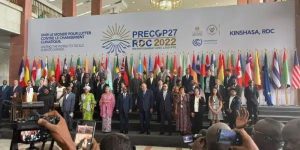Your challenge – and your capacity – is to integrate areas of knowledge and levels of governance, designing nature-based solutions across land- and seascapes. This requires laws, regulations, the assignment of ways and means, and oversight, that only legislators can provide’.
Ahead of the GLOBE COP26 Legislators Summit at the Scottish Parliament (5-6 November 2021), and on the heels of the recently-concluded COP15 in Kunming, we are delighted to host this special Blog by Elizabeth Maruma Mrema, Executive Secretary of the Convention on Biodiversity, linking the Kunming and Glasgow agendas and the challenge for legislators.
It is my distinct pleasure to contribute a few words to this international gathering of parliamentarians parallel to the COP26 conference in Glasgow, to discuss the climate and nature emergencies and offer suggestions towards a green, fair and resilient recovery.
Hopefully these discussions will build on the recent outcomes of part one of COP-15, where governments from around the world opened final discussions towards a new set of global goals for nature over the next decade with the adoption of the Kunming Declaration.
At part one of COP-15 in Kunming, we saw the launch of a new Chinese biodiversity fund, with China pledging $233 million to protect biodiversity in developing countries, while Japan extended its own ten-year biodiversity investment by $17 million.
Furthermore, the European Commission announced plans to double funding for biodiversity, the United Kingdom assigned a significant part of its increased climate funding towards biodiversity with France committing 30% of its climate funds into biodiversity. Finance for Biodiversity pledged to protect and restore biodiversity that brings together financial institutions with assets of 12 trillion Euros. This continues a trend that saw philanthropic organizations pledge $5 billion to protect nature just a month ago.
These are all critical contributions. There is a tremendous sense of urgency to act quickly on a smart COVID-19 economic recovery, in ways that address both the climate and nature emergencies.
It is no coincidence that our organizations share a history of three decades: they react to the same challenges and come to similar responses. We need integrated agendas to address the joint crises of economic and political stability, climate and nature. Thus, it is critical for legislators to understand the indivisible links between nature, climate and achieving the Sustainable Development Goals, and to recognize the critical role of nature and the post-2020 global biodiversity framework in the menu of legislative tools.
Nature-based solutions, as formulated by IUCN and many other players as well as ecosystem-based approaches, and as included in target 8 of the first draft of the post-2020 framework, must be the preferred choice in formulating approaches for transformative action in the face of the global emergencies.
The Convention on Biological Diversity is also preparing a set of complementary implementing strategies to the framework, including approaches to resource mobilization, mainstreaming, capacity building, and monitoring and reporting building on universally acceptable indicators.
The central issue before parliamentarians wanting to lead and guide their constituencies in these challenging times is how to translate these whole-of-government and all of society approaches into a coherent system of laws and regulations, incentives and disincentives, to guide our future towards living in harmony with nature.
Your challenge – and your capacity – is to integrate areas of knowledge and levels of governance, designing nature-based solutions across land- and seascapes. This requires laws, regulations, the assignment of ways and means, and oversight, that only legislators can provide.
We ask you to be transformative, and we welcome GLOBE’s leadership in organizing this discussion. The climate and nature emergencies call for “bending the curve”; we need your help to steer away from harmful subsidies and incentives that in many cases we’ve become used to in our production and consumption modes. As we just heard at the UN’s Food Systems Summit in September, the vast majority of current agricultural subsidies are damaging to nature and social conditions.
It is also clear that there are no separate solutions to the economic, climate and nature crisis we are living through – the same can be said for water and food security, and for human health. I hope that GLOBE can continue to contribute to our work and to our main events, and we look forward to your engagement and hearing from you next spring at COP-15.








